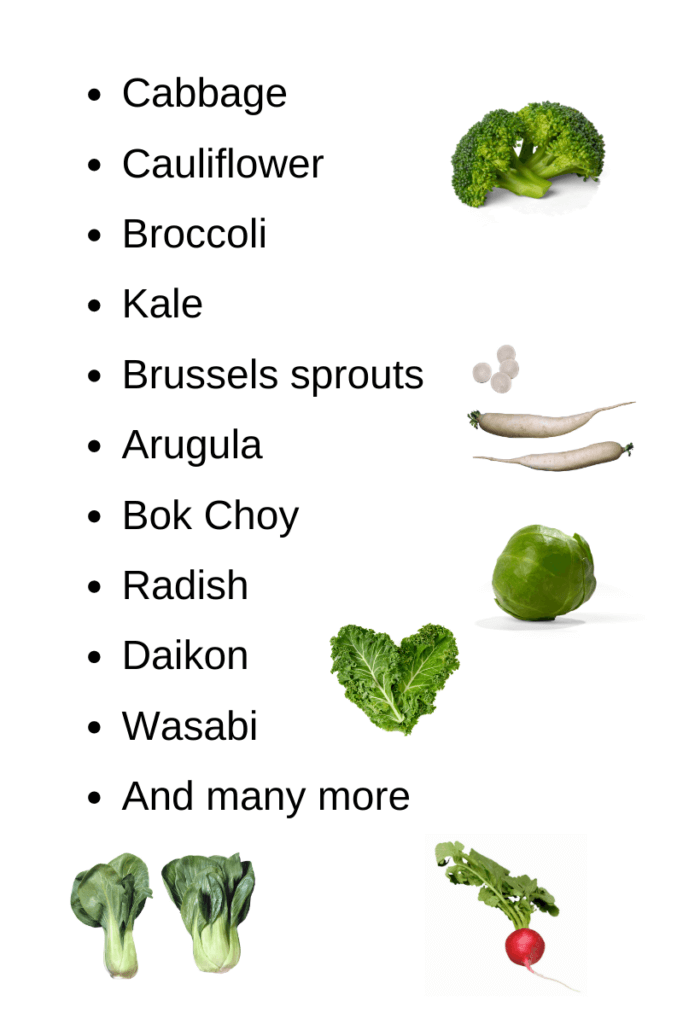This is one of the commonest questions I am asked, “Doctor, you have asked me to eat low carbohydrate vegetables like broccoli and cauliflower, but my dietician/doctor/friend said that they are harmful for my thyroid” Is that true?
What are cruciferous vegetables?
Cruciferous vegetables are vegetables of the family Brassica also called Cruciferae, from the shape of the flowers which resemble a cross.
The image below lists some of the common cruciferous vegetables.

Plant chemicals in cruciferous vegetables
Cruciferous vegetables have several beneficial effects because of the plant chemicals they contain. Sulphoraphanes, glucosinolates, and goitrin are some of the plant chemicals produced by cruciferous vegetables.
Sulforaphanes and glucosinolates have anticancer activity and also help in liver detoxification pathways. Additionally, most of the cruciferous vegetables are low in carbohydrates.
Though primarily from animal studies, goitrin has shown the potential to affect thyroid hormones.
How does goitrin affect thyroid hormones?
Goitrin has the ability to reduce iodine utilization by the body.
Iodine is a micronutrient necessary for thyroid hormone production. Worldwide, iodine deficiency still remains a major cause of goitre (large swellings in front of the neck) and mental retardation in children.
BOTTOM LINE
If you have adequate iodine in your body, goitrins from cruciferous vegetables will not adversely affect your thyroid function.
How will you get adequate iodine?
(Separate post on Iodine and Thyroid will be posted later.)
A good quality multivitamin should contain about 150 micrograms of iodine daily. During pregnancy and breastfeeding, you need more iodine.
Seafood is an important source of dietary iodine. Iodised salt has had a large impact in those parts of the world, like the sub-Himalayan regions where iodine deficiency is epidemic.
Important to keep in mind that taking excess iodine in the absence of low iodine levels can be very harmful because it can cause thyroiditis.
How much is too much?
A case report ((1))in The New England Journal of Medicine discusses an 88-year-old Chinese woman who was brought to the emergency department in myxoedema coma (severe hypothyroidism leading to coma). She did not have thyroid dysfunction before. She was taking 1 to 1.5 kilograms of raw bok choy every day for several months in the belief that it would take care of her diabetes! That is about 21 cups of bok choy every day!! The report didn’t mention whether her diabetes got better but it sure sent her into a coma with a TSH of 74.4 mIU/L!
What about more reasonable consumption of cruciferous vegetables?
10 healthy volunteers ate 150 g (about 15 ) of cooked brussels sprouts daily for 4 weeks included in a normal diet. The sprouts contained high concentrations of glucosinolates, but there was no harmful effect on thyroid function tests. ((2))
Drinking a broccoli sprout beverage for 12 weeks showed no adverse effects on thyroid function. ((3))
BOTTOM LINE:
- Cruciferous vegetables will not harm your thyroid function as long as you don’t overdose on them!
- On the contrary, cruciferous vegetables contain many beneficial plant chemicals.
- Most cruciferous vegetables are low in carbohydrates, and therefore may actually help you lose weight!


